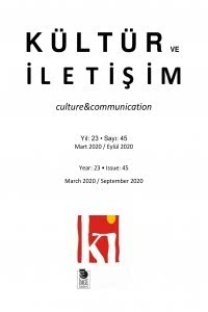Why Does Ideology Still Matter in Social Studies?
This study tries to ask some questions and to underline some points with respect to the study of ideology. lts main objective is firstly to show that the concept of ideology is still a plausible concept, and that an approach to ideology, irrespective of the discipline in which it is developed, entails an understanding that the meaning of the concept of ideology is embedded in language games in which it is utilized, and is partially fixed through an hegemonic operation. Secondly, it is to show that an understanding of ideology in itself needs to reconsider certain philosophical categories such as truth, subject, consciousness, and the misrecognition/distortion of reality, which have traditionally been central to the theories of the formation and nature of ideology itself and have created a conceptual puzzlement. It argues that despite all the difficulties and ideological problems that the concept of ideology causes, it is not justifiable to discard the notion altogether. lt suggests that transcending the conceptual blindspot in the theories of ideology doesn't necessarily mean a total abandonment of those traditional philosophical categories either. The third point this paper emphasises is the political character of ideology. Put it differently, its aim is to underline that an approach to ideology entails an understanding of the formation and nature of the political and vice versa.
Why Does Ideology Still Matter in Social Studies?
This study tries to ask some questions and to underline some points with respect to the study of ideology. lts main objective is firstly to show that the concept of ideology is still a plausible concept, and that an approach to ideology, irrespective of the discipline in which it is developed, entails an understanding that the meaning of the concept of ideology is embedded in language games in which it is utilized, and is partially fixed through an hegemonic operation. Secondly, it is to show that an understanding of ideology in itself needs to reconsider certain philosophical categories such as truth, subject, consciousness, and the misrecognition/distortion of reality, which have traditionally been central to the theories of the formation and nature of ideology itself and have created a conceptual puzzlement. It argues that despite all the difficulties and ideological problems that the concept of ideology causes, it is not justifiable to discard the notion altogether. lt suggests that transcending the conceptual blindspot in the theories of ideology doesn't necessarily mean a total abandonment of those traditional philosophical categories either. The third point this paper emphasises is the political character of ideology. Put it differently, its aim is to underline that an approach to ideology entails an understanding of the formation and nature of the political and vice versa.
___
- Fairclough, Norman (1991). Language and Power. London and New York: Longman.
- Freeden, Michael (1996). Ideologies and Political Theory: A Conceptual Approach. Oxford: Clarendon Press.
- Giddens, Anthony (1991). "Four Theses on Ideology." In ideology and Power in the Age of Lenin in Ruins. Arthur & Marilouise Kroker (eds.). Montréal: CultureTexts.
- Kuhn, Thomas S. (1970). The Structure of Scientific Revolution. (Second edition, enlarged). Chicago and London: The University of Chicago Press.
- Laclau, Ernesto (1996). "The Death And Resurrection Of The Theory of Ideology." Journal of Political Ideologies 1(3): 201-221. (http://globalvgw1).
- Laclau, Ernesto (1991). "The Impossibility of Society." In Ideology and Power in the Age of Lenin in Ruins. Arthur and Marilouise Kroker (eds.). Montréal:
Culture Texts.
- Laclau, Ernesto (1990). New Reflections on the Revolution of Our Time. London: Verso
- Lefort, Claude (1991). "On the Genesis of Ideology in Modern Societies." In Ideology and Power in the Age of Lenin in Ruins, Arthur and Marilouise Kroker (eds.). Montréal: Culture Texts.
